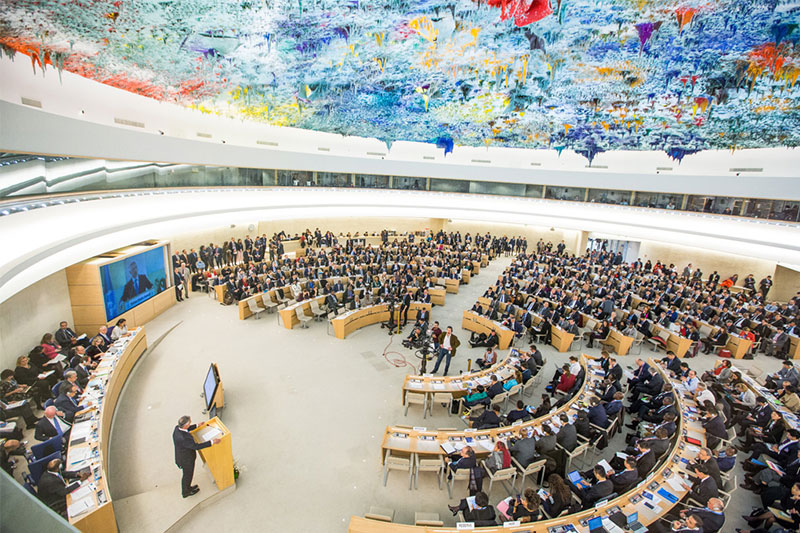Palace justifies rejection of UN recommendations

The Human Rights Council chamber in Geneva UN/Elma Okic
MANILA, Philippines (UPDATED 5:53 p.m.) — Malacañang Monday justified the Philippine government’s rejection of more than half of the recommendations it received during its third Universal Periodic Review (UPR) in Geneva, saying it is in line with the country’s independent foreign policy.
The Philippines has rejected 154 of 257 recommendations by the United Nations Human Rights Council (UNHRC) including allowing a UN special rapporteur Agnes Callamard to look into alleged extrajudicial killings, halting efforts to restore death penalty and lowering the age of criminal responsibility.
During the UN General Assembly last Saturday, Foreign Affairs Secretary Alan Cayetano cautioned against “misinformation” on the Duterte administration’s war on illegal drugs and decried what he called the “politicization of human rights.”
READ: Cayetano uses restrictive EJK definition, experts say
Presidential spokesman Ernesto Abella said the Philippines has the prerogative to accept or reject the recommendations of the UN.
“The Philippines has committed to fully accept 103 out of the 257 recommendations that we received during the Third Philippine Universal Periodic Review in Geneva,” Abella said.
“A careful review and inclusive consultation with inputs from various stakeholders, especially from representatives from the State’s executive, legislative, and judicial departments was done, and in line with our independent foreign policy,” he added.
READ: Philippines rejects nations' positions on drug war deaths
Palace: UN acknowledged Philippine achievements
Abella claimed that the UNHRC had recognized the accomplishments of the Duterte administration on upholding human rights.
“What really matters is that the United Nations Human Rights Council has adopted the Philippine report recognizing the country’s human rights record and commitments under the leadership of President Duterte.”
The Cabinet official added that President Rodrigo Duterte is willing to host a contingent from the UN to open up an office in the country.
"I’m sure from the president’s perspective that... the office, if they set up here, would be a welcome addition, would be a welcome development," Abella said.
Duterte has invited the United Nations Human Rights Council to set up a satellite office in the Philippines to fill in the duties of the Commission on Human Rights.
The CHR, which has been investigating deaths under Duterte's war on drugs, was given a measly budget of P1,000 by the House of Representatives. The president has also suggested realigning the P678 million proposed budget of the CHR to purchase body cameras for the police.
CHR's budget was later restored by the House committee on appropriations.
Exercising 'independent foreign policy'
Asked why the Duterte administration rejected the recommendation despite its earlier invitation for Callamard to visit the Philippines, Abella said: “This is all part of our prerogative to exercise independent foreign policy.”
"There is no denial there. In fact, the UN has accepted what we’ve said. However, it’s just that we maintain that there are certain parameters that need not be infringed upon," he said.
Cayetano said that the adoption of the Philippines' UPR report demonstrates that the country "has nothing to hide with its human rights record."
READ: Ignoring issues raised, Philippines claims 'victory' in UN review
The Philippine delegation at the UN session in Geneva accepted only 103 out of 257 recommendations made by member-states during the UPR last May.
- Latest
- Trending




























